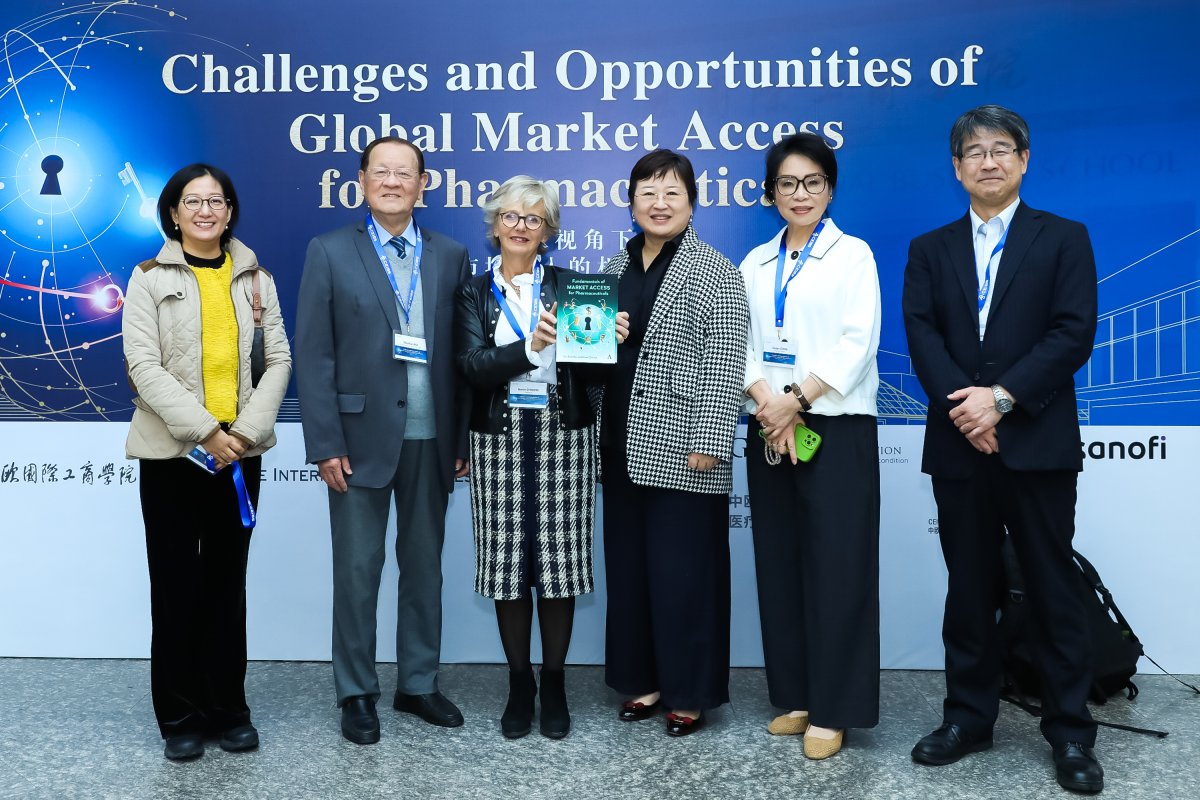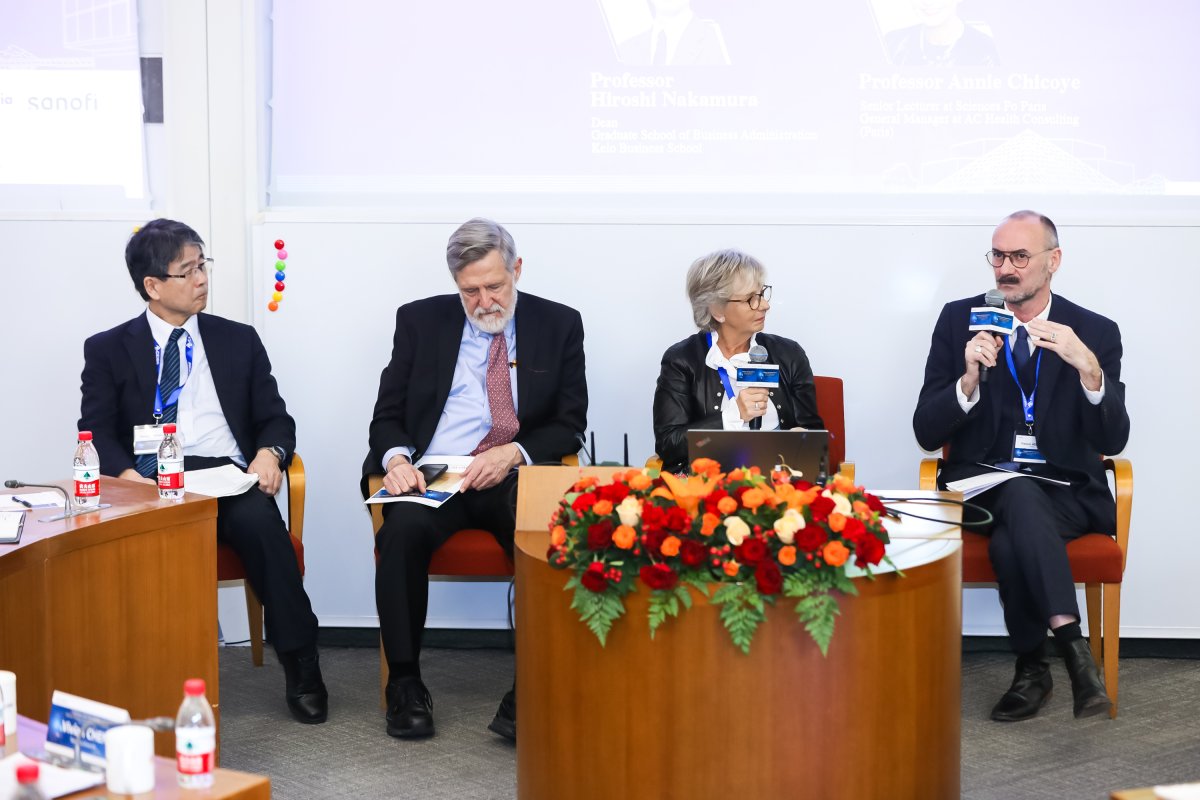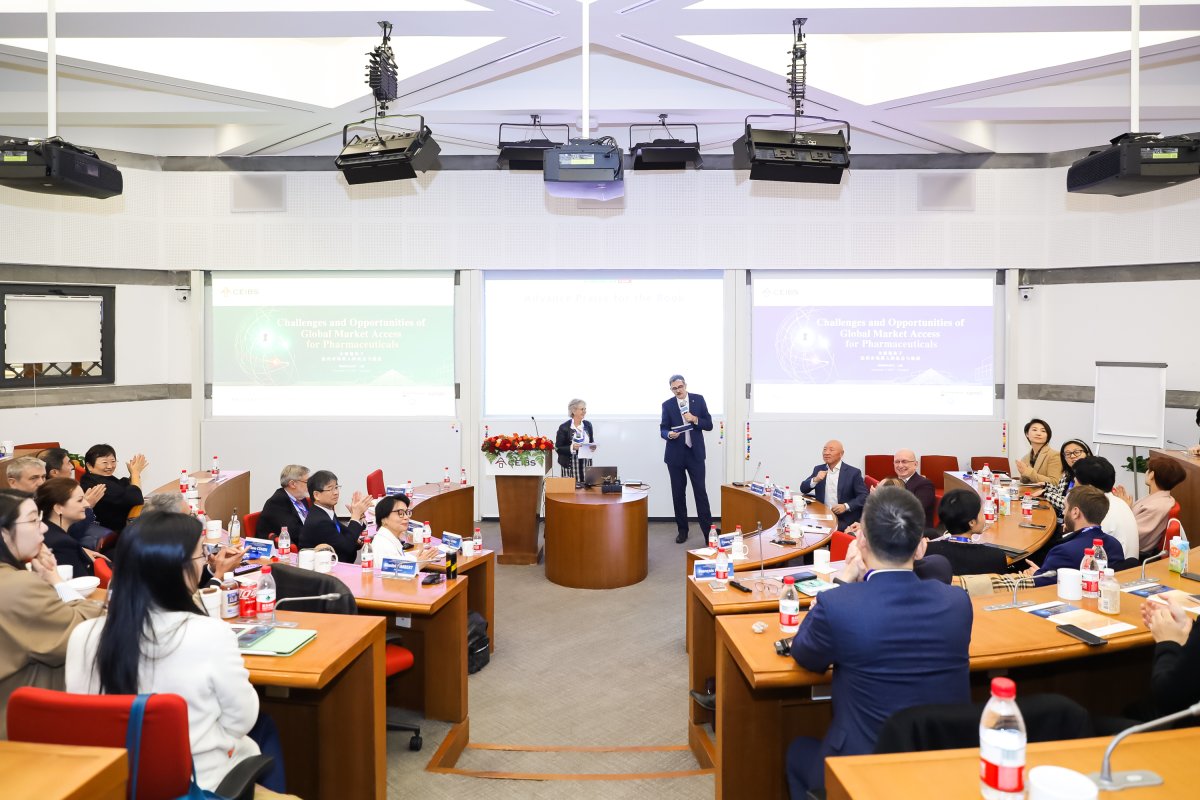Symposium at CEIBS Shanghai campus discusses challenges facing global access to pharmaceuticals
December 5, 2024. Shanghai – The global pharmaceutical sector still struggles to balance accessibility against incentivising innovation for new drugs to fight disease, experts heard at an industry event on CEIBS Shanghai campus recently.
Influential figures from the pharma world gathered at a symposium, which was organised by the CEIBS Alumni Healthcare Association, to discuss issues raised by a new book co-authored by CEIBS Adjunct Professor Eric Bouteiller and Senior Lecturer at Sciences Po Annie Chicoye.
The book, Fundamentals of Market Access for Pharmaceuticals, takes a broad look at some of the biggest challenges facing countries around the world, in particular how to maximise benefits for patients whilst attempting to answer difficult decisions regarding pricing and accessibility for companies and governments.
Keynote speaker Professor Emeritus Lou Garrison from University of Washington, Seattle, spoke about the topic of global products and local launches, describing the world's pharmaceutical sector as a hugely complex ecosystem of research and development, regulation, and commercialisation, while noting that the industry was struggling to balance the correspondingly wide range of stakeholder interests. He referred to the book as a “very significant step for clarification of what we need for economic policy”.
Prof. Garrison said the world of pharma had evolved hugely over the years, but added, "make no mistake about it, it needs to evolve further to improve access for patients worldwide."
“In general, we health economists have done a poor job of communicating the economics of pharmaceutical market design to the general public and to policy makers, in terms of the role of the patent system, intellectual property, in promoting innovation, and then ultimately in improving access through the transition to generics,” he continued.
He pointed to a lack of understanding of the economics underpinning pharmaceutical innovation, particularly the roles of patents and intellectual property in fostering innovation and transitioning to generics, and introduced the concept of health as an investment. He stressed the ultimate goal of the industry should be improving overall well-being or happiness for citizenry, and praised Prof Chicoye and Prof Bouteiller’s publication.
“This book is a very significant step toward the education that we need that's really meeting what is an unmet, economic policy,” he added.
The unique economic nature of medicines was another area worthy of further discussion, Prof. Garrison said, pointing out that medicines were both global public goods which everyone can benefit from, and disruptive innovations that reshape existing clinical pathways. He referred to economic theory in that prices rewarding for innovation and risks should be differentiated depending upon counties income level, but country policies such as international reference pricing, lack of real world data consideration, or “free rider” behaviours come into the way. He concluded the world of pharma had evolved hugely over the years, but significant room for improvement still existed.
The event was hosted by Prof. Bouteiller, who emphasised that pharmaceutical innovation was advancing rapidly and offering treatments for previously untreatable diseases, but that access to drugs from a global perspective remained uneven. Developed countries faced affordability and sustainability challenges in their public and private insurance systems, and the COVID-19 crisis illustrated the depth of access and affordability issues in developing economies.
Prof. Bouteiller stressed that China, now the world’s second-largest pharmaceutical market, due to economic growth, social security advancements, and successful innovation strategies, had much to offer the global discussion on building a sustainable healthcare system.
Also joining the event was Prof. Hiroshi Nakamura, Dean of Keio Business School in Tokyo. He discussed the Japanese healthcare system's focus on balancing accessibility to healthcare with cost containment. While the system is efficient in achieving rapid reimbursement of approved drugs (within two-to-three months of approval), it faces challenges, explained Prof. Nakamura.
He emphasised that Japan's main priority is to "guarantee access at lower cost,” and explained "this achievement is made possible because the Japanese government determines the price at a lower level compared to the U.S.". Prof. Nakamura added, however, that there was a trade-off between affordability and innovation, saying, "some pharmaceutical companies are reluctant to develop their products in Japan."
He added that Japan was evolving a policy to balance affordability with fostering innovation, by trying to promote incentives for R&D in Japan.
Prof. Chicoye, co-author of the book, emphasised the role of patient advocacies, and how, since the turn of the century, the European Union has increasingly involved them in regulatory and value assessment decisions.
“I believe our book makes a serious contribution to global understanding of the various issues surrounding drug innovation and the pharmaceutical industry today, and our commitment to trying to improve public health as a whole is reflected in the high calibre of speakers we invited to today’s event,” she said, adding that “Professor Boutellier did an excellent job of highlighting the China perspective for delegates today."
François Houÿez, Information & Access to Therapies Director & Health Policy Advisor at the European Organisation for Rare Diseases (Eurordis), attested to this. He highlighted patient involvement in decision-making. “Our motto is to make sure patients are involved in decision-making for all decisions that can affect their lives, with equal credibility as other experts,” Mr. Houÿez said. He went on to highlight the role of patient organisations, particularly Eurordis, which advocates for patient involvement at every stage of drug development, from initial consultations with biotech companies to decisions about market approval, reimbursement, and scientific evaluations. The aim, he emphasised, was to ensure patients are treated as credible experts in decision-making processes.
He highlighted the rapid pace of scientific advancements, particularly in treating diseases previously considered untreatable, and emphasised the need for healthcare systems to keep up with innovation by focusing on two core principles: preparation and partnership. Preparation includes educating healthcare professionals, enhancing diagnostic capacity, and engaging patients early. Partnership involves collaboration across all stakeholders, including health technology assessment bodies, to ensure effective evaluation and decision-making for innovative treatments.
“Science is moving at a pace we have never experienced before, said Mr. Houÿez, adding “we need to make sure that the way we bring this information to patients and evaluate patients also keeps up with that pace."

















